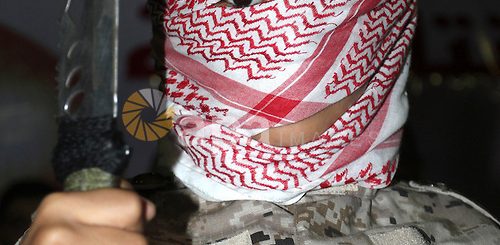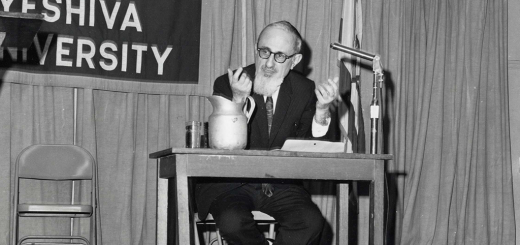Moving Commentary: An Occasional Travelogue 1

[Perhaps more for catharsis than anything else, I will BEH try from time to time to offer reflections on my move to Israel that might be of interest to some readers. To everyone else, take this as a request to indulge my need to escape the difficulties of the day by banging at the keyboard.]
People matter; things don’t matter. Perhaps in some perfect world that is true, but the sentiment didn’t work for me. Closing up a house we had lived in for 37 years and raised all our kids was much harder than we thought. Maharal argues that property is an extension of our core selves. It certainly felt that way with each decision of what to put on the lift, what to give away, and what to discard. The movers who will place their catch on a container and give it over to a sea-faring vessel came a week ago. Yet, we were still not finished dealing with what is left over. It was a relief to find homes for (some of the) furniture that had no real resale value but was entirely functional. I’m still at a loss to understand why mere objects – most of which were taken for granted – should mean so much, should provide such a sense of security and belonging, which now was so rudely disrupted.
My rational self was greatly helped along by a thought of Rav Dessler – even if my heart didn’t quite keep up with the compelling logic. Chazal tell us that as Yaakov neared the border of Israel as he sought to return to his father’s house after over two decades, the angels of the Land came out to escort him. There are several beautiful explanations. Rav Dessler understands Chazal to be telling us about our possessions. At every stage of life, we are given the tools, the kelim, that are best suited to help us in our personal mission. If we achieve one of the goals along the way, we are given new equipment that is relevant to achieving the next goal. The angels of Eretz Yisrael that sought Yaakov out signified that the kelim he had been given for his years in the house of Lavan were now irrelevant to the next phase of his life. The angels would introduce him to the new set of items that he would use in the Holy Land. Parting with lots of things that had shaped my immediate environment became a bit easier when I reflected upon this. These things had been useful in the past; life in Israel would require a different set of items. The familiar items became obsolescent not because of their age, but because they no longer had a role in future avodah.
In one area, this did not work at all. We would be going from a 2400 sq. ft. house to a much smaller apartment. There would not be room for many, many of the seforim I had acquired over the decades. I had to divest myself of hundreds. It is one thing to get rid of familiar tchatchkes, but quite another to discard perfectly good seforim. A local outreach organization took a few score English works. But no one was interested is volumes in perfect shape, but that had become outdated because newer editions were available.
No one. We are so well-off that we treat seforim just a few years old like a dated iPhone: functional, but who wants it? The upshot is that I made many trips to a special container that Chabad provides for the community for sheimos. Nothing hurt more than to take precious Torah seforim – many in mint condition – and place them in that bin.
Shaul Stampfer in Lithuanian Yeshivas of the Nineteenth Century describes the opening day of a new zman in Volozhin, where competition was severe simply to receive a copy of the mesechta that the yeshivah would learn in the coming months. There just were not a sufficient number of basic texts to go around.
We don’t fight anymore about who will be privileged to receive a borrowed gemara for a semester. In access to Torah texts, there is affluence even in the midst of poverty. This is a wonderful blessing, but it comes at a price. Arms that coddle a sefer should not have to let it go into a discard bin. We should have to treasure every sefer like a family heirloom – but we can’t, because we have so many. I don’t know what effect this has on our souls, on our appreciation of Torah itself. But I wonder about it.
And I realize that one of the reasons why I am drawn so strongly to make the move is to counter the conspicuous consumption of the West in so many other areas. While Israel is not that far behind, it is still a place where some simplicity is still obtainable, where not everything that exists is, to use the expression in vogue, “must-have.” It will be a struggle, but lowering the bar on expectation has to be, in the long run, good for the neshamah.




Rabbi and Rebbitzen Adlerstein
Wow!
Panah zivah hodah hadarah.
Our Los Angeles community will have lost its luster, light and beauty.
Everyone in the Kiruv and Torah world in this city (and well beyond) knew deep down that when all else fails, we can always send them to the Adlersteins; The brilliant academic or the brainy know it all would walk into the Adlerstein home embraced, loved, respected and awestruck by the grace, depth and brilliance of Rabbi and Rebbitzen Adlerstein.
Their hashpaa has been so profound and their demeanor so humble that while we know every Jew is unique and special, somehow they seem more unique than others
Tzeischem L’shalom Rabbi and Rebbitzen Adlerstein – we are jealous and happy for your
Aliyah and will sorely miss your reliable regal presence in our community
Tzeischem Lshalom Uvoachem Lshalom
i admire your move to yerushalayim. one minor consolation as you go from 2400 SF to about half that in ir haKodesh. in ir hakodesh, as in the BH it feels roomier. In addition to Divine interventions, as my BIL says, his apartment in yerushalayim has a big kitchen, a big LR and a big DR; all the same room. In addition, you will see limited wasted space for entry foyers, hallways, etc.
i have the opposite problem with a second home in Florida. When I look for a sefer or book, it is in the other house.
Perhaps the answer is that we see in that act of discarding, a reminder of our own mortality.
I’m jealous. After I convert I plan to make Aliyah. Not sure whether I’d choose Jerusalem, Acre, Nazareth Illit, or Maale Adumim.
Random question: Why “move” and not “make aliyah”?
We’re doing what many couples do. My wife is coming as an oleh. I’m not initially. So technically, it is not aliyah
klitah kalah
What is the advantage of this approach?
Kt
Well, technically and legally, no. But halachically, certainly. Welcome!
There are reasons why people do not want to take on a new citizenship. The decision f what status to take depends on various circumstances. Having said that unless Rabbi Adlerstein can stay in Israel by some student visa which younger Olim do, it keeps them out of IDF get a long visas increased to five years from two recently, eventually if they stay they’ll make him become an Oleh if he wants to stay in country,
Of course, in Ravbi Adlersteins case assuming he and his wife are Americans, his wife Oleh status would entitle her require her to have Israel in general as the dominant country under US Israel income tax treaty, the issue is complex. Depends on certainty one has that they will stay in Israel. Probably AAcCII might be a good source of nof in this question
I am aware of someone who spends 183 days a year in both Canada and Israel. How by leaving after midnight Israel arrive Canada same day gets credit for living in both. Unlike US Medicare both Canada and Israel require residence of 183 days a year to receive medical coverage.
Issue is complex. But certainly Nachum it is complex because of keeping options open.
The chief reason given is that through a quirk in the law, it is easier to deal with cars in Israel as a tourist than as an oleh
I can so much relate to this, as I am a total pack rat. While after many decades, I did manage to get rid of my high school report card from too many years ago, I have since then regretted having done so. Same with my copy of Menachem Begin’s classic book, The Revolt. What kind of outright traitor am I, to have sold that book online for a mere bowl of lentils (symbolically speaking)?
Books are by far the most difficult item to get rid of. Torah books, that goes without even saying, but even when it comes to secular books. I have had books that I managed to get rid of, only to buy them again, only to get rid of them again, only to buy them again, and on and on it goes. Books are by far the greatest human invention ever, it is the key to almost any real meaning or understanding in life, it is our gateway out of barbarism and into civilization and if we are fortunate, we even get to taste a little bit of Heaven in them. Get rid of them? Never. And so I sit in my tiny apartment, with almost no room to walk in it at all, because there are books everywhere, with no real plans to get rid of them, and with every intention of getting even more great books. In fact, I will confess to having this dream of Rabbi Adlerstein one day writing a Torah commentary exclusively based on the Spanish Rishonim and the Kabbalists of Tsfat, and then having it for sale on Amazon. I might be the first one to buy it.
And as for Rabbi Adlerstein making aliyah, what can I say to that? I have known the man for 30 years….He has been my favorite Rabbi all that time. I still remember the first time I heard him speak. It was at Aish HaTorah here in Los Angeles. I sat there symbolically open-mouthed, so blown away was I by his lecture, and how his mind worked. He is kind of like a modern-day Rambam or Rav Hirsch or name some other independently-minded, absolutely brilliant, solid Torah scholar who is such a thinker, that even his jokes are thought-provoking. I think I speak for many people when I say that while all of us wish him well in Israel, that we will nevertheless feel a real loss in our own local Jewish communities, and yet who knows? Maybe life for all of us Jews will become so unbearable here in America, that we will by necessity have to join him in Israel anyway in some kind of massive emigration to our Jewish land where all of us Jews should be anyway.
I hope that even after moving to Israel, that Rabbi Adlerstein will continue to write articles at least on this Cross-Currents website.
Fascinating comment re books. But as technology is developing at ever increasing speeds, it won’t be long until physical books are obsolete and even siddurim will become Shabbat compliant e-siddur.
So thrilled for you making aliya. You’ve been my teacher/mentor for 25 years. I owe you much.I shall miss you much. Happy trails to you!
It’s not just books. When imi Moradi zll”he was nifteret we tried multiple groups to try to give away usable furniture, appliances etc. to little avail. It amazes me how there is so much poverty, especially in the orthodox world, but no demand for anything but new or very lightly used merchandise. Hashem Yair enai as to the reasons.
Kt
Hatzlacha rabbah on the move!
R. Berel Wein has an article titled “My Books” where he also describes having to leave a substantial part of his library in the United States. He relates an anecdote regarding Prof. Harry Wolfson of Harvard, who was once confronted by one of his colleagues who said to him: “Why do you Jews think you are so special?!” Wolfson is reported to have coolly answered: “As far as I know, we are the only people who when we drop a book on the floor, we pick it up and kiss it.”
Yishuv tov!
kvod harav— did you try posting to hillygram before putting seforim in sheimot? i find that when seforim are laid out on a table , like in free, they often find takers…..
I called various people and institutions. JLE did take about 70 volumes.
May we all have the same issues in making Aliyah Bimherah Vyameinu and may we all have a klitah tovah. LA the overall Torah community and this wondetful pary of the Jewish blogosphere will miss your incisive comments on all issues.
don’t discard report cards, public library cards or whatever. useful to prove your having lived in the States until a certain age which will enable grandchildren bli ayin hora born abroad to attain American citenship.
I love how you have articulated some of your thoughts and feelings. I will miss. you but hope to come visit.
It was after Yaakov retrieved his “pachim ketanim” that he was attacked by the saro shel Esav. This medrash is consistent with Rav Dessler’s idea.
I am reading your Aliya diary avidly – it is almost a vicarious experience. Please update us regularly.
Loving your travel log, I started with #3 & went backwards. Always difficult to discard pieces of life, full of memories & events. You will begin to collect new, beautiful & unique experiences in your proud Aliyah.